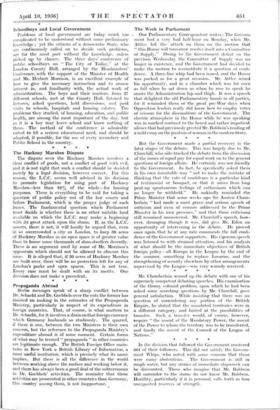But the Government made a partial recovery in the later
stages of the debate. This was largely due to Mr. Churchill, who side-tracked the debate from the discussion of the issues of equal pay for equal work on to the general questions of foreign affairs. He certainly was not friendly to the Government. In fact, he specifically asked them in his own inimitable way "not to make the mistake of thinking that the vote of confidence is a particular kind of testimonial or bouquet, or that it arises from long pent-up spontaneous feelings of enthusiasm which can no longer be withheld." He unkindly reminded the Prime Minister that some weeks ago Sir Austen Cham- berlain "had made a most grave and serious speech of criticism and even of censure addressed to the Prime Minister in his own presence," and that those criticisms still remained unanswered. Mr. Churchill's speech, how- ever, damaging though it was, did give Mr. Eden an opportunity of intervening in the debate. He proved once again that he at any rate commands the full confi- dence of the Government supporters. His vigorous speech was listened to with strained attention, and his analysis of what should be the immediate objectives of British foreign policy—all Europe in the League by the end of the summer, something to replace Locarno, and the strengthening of security elsewhere by other arrangements supervised by the League—was very warmly received.










































 Previous page
Previous page